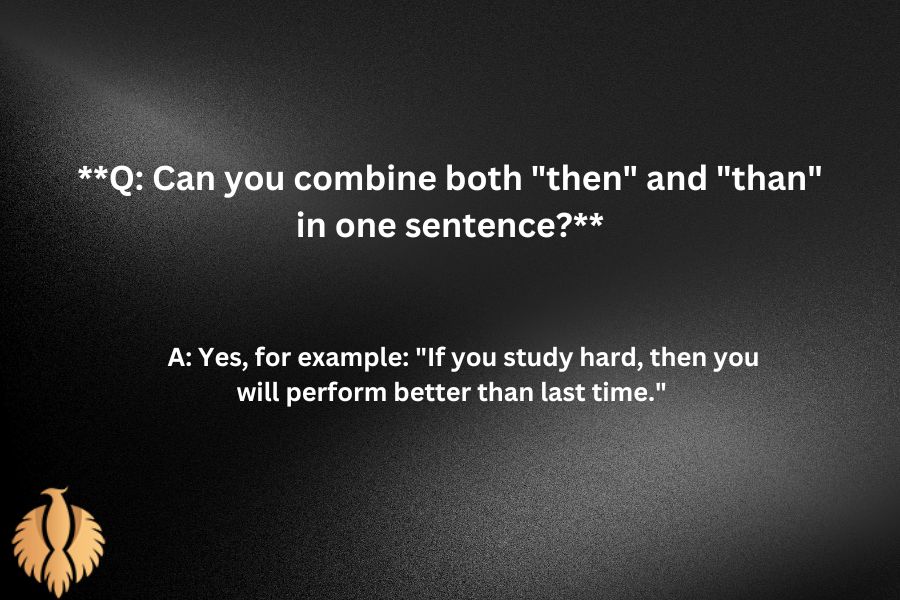As an English teacher, I’ve encountered countless students struggling to differentiate between the words “then” and “than.” It’s a common conundrum, but don’t worry, I’m here to clear things up for you!
The Distinction: “Then” vs. “Than”
So what is the difference between then and than? “Then” is an adverb that typically refers to time, sequence, or consequence. For example, “I went to the store and then I came home.” “Than,” on the other hand, is a conjunction used for making comparisons, like “I like chocolate more than vanilla.”
You might also enjoy: Boys’ or Boy’s– Which One is Correct? + Example
40 Differences of “Then” vs. “Than”:
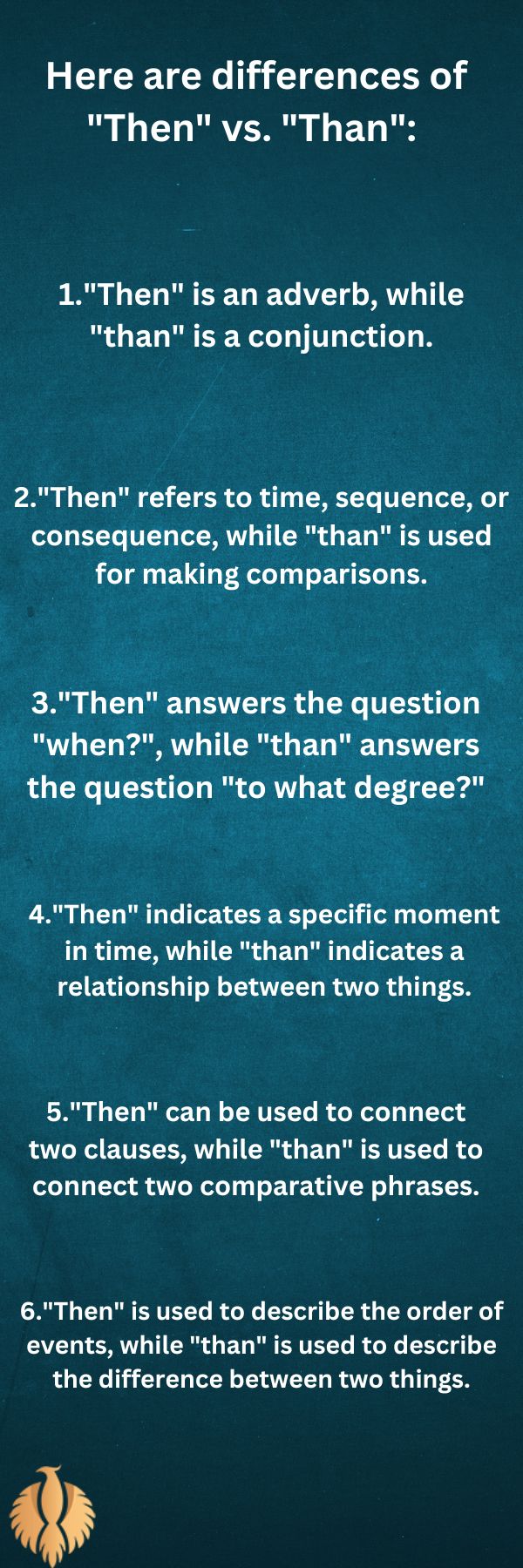
Wonderful, let me dive into the 40 differences between “Then” and “Than”:
- “Then” is an adverb, while “than” is a conjunction.
- “Then” refers to time, sequence, or consequence, while “than” is used for making comparisons.
- “Then” answers the question “when?”, while “than” answers the question “to what degree?”
- “Then” indicates a specific moment in time, while “than” indicates a relationship between two things.
- “Then” can be used to connect two clauses, while “than” is used to connect two comparative phrases.
- “Then” is used to describe the order of events, while “than” is used to describe the difference between two things.
- “Then” is often used to transition between ideas, while “than” is used to introduce the second part of a comparison.
- “Then” can be used to indicate a logical conclusion, while “than” is used to indicate a preference or superiority.
- “Then” is used to describe a specific point in time, while “than” is used to describe a relative difference.
- “Then” is used to describe a sequence of actions, while “than” is used to describe a relationship between two qualities.
- “Then” is used to describe a temporal relationship, while “than” is used to describe a comparative relationship.
- “Then” is used to describe a chronological order, while “than” is used to describe a hierarchical order.
- “Then” is used to describe a causal relationship, while “than” is used to describe a correlative relationship.
- “Then” is used to describe a linear progression, while “than” is used to describe a divergent comparison.
- “Then” is used to describe a specific point in time, while “than” is used to describe a relative difference in degree.
- “Then” is used to describe a sequential order, while “than” is used to describe a comparative order.
- “Then” is used to describe a temporal consequence, while “than” is used to describe a comparative consequence.
- “Then” is used to describe a chronological transition, while “than” is used to describe a comparative transition.
- “Then” is used to describe a specific point in a process, while “than” is used to describe a relative difference in a process.
- “Then” is used to describe a logical progression, while “than” is used to describe a comparative progression.
You might also enjoy: To Bad Or Too Bad – Correct Grammar + Examples [2024]
- “Then” is used to describe a temporal relationship between events, while “than” is used to describe a comparative relationship between qualities.
- “Then” is used to describe a sequential order of actions, while “than” is used to describe a hierarchical order of preferences.
- “Then” is used to describe a causal relationship between ideas, while “than” is used to describe a correlative relationship between comparisons.
- “Then” is used to describe a linear progression of events, while “than” is used to describe a divergent comparison of attributes.
- “Then” is used to describe a specific moment in time, while “than” is used to describe a relative difference in degree or quantity.
- “Then” is used to describe a chronological transition between steps, while “than” is used to describe a comparative transition between preferences.
- “Then” is used to describe a logical consequence of an action, while “than” is used to describe a comparative consequence of a quality.
- “Then” is used to describe a temporal sequence of occurrences, while “than” is used to describe a comparative hierarchy of characteristics.
- “Then” is used to describe a specific point in a process or timeline, while “than” is used to describe a relative difference in a measure or attribute.
- “Then” is used to describe a logical progression of ideas, while “than” is used to describe a comparative progression of preferences.
- “Then” is used to indicate a specific moment in time, while “than” is used to indicate a relative difference in degree.
- “Then” is used to connect ideas in a sequence, while “than” is used to connect ideas in comparison.
- “Then” is used to describe a temporal relationship, while “than” is used to describe a comparative relationship.
- “Then” is used to indicate a particular point in a series of events, while “than” is used to indicate a particular point in comparison.
- “Then” is used to connect clauses that describe a chronological order, while “than” is used to connect clauses that describe a hierarchical order.
- “Then” is used to describe a logical consequence, while “than” is used to describe a relative superiority or preference.
- “Then” is used to indicate a specific time or order, while “than” is used to indicate a specific degree or comparison.
- “Then” is used to connect ideas in a temporal sequence, while “than” is used to connect ideas in a comparative framework.
- “Then” is used to describe a particular moment or stage, while “than” is used to describe a particular relationship or difference.
- “Then” is used to indicate a subsequent action or event, while “than” is used to indicate a comparative judgment or preference.
The Meaning of Then
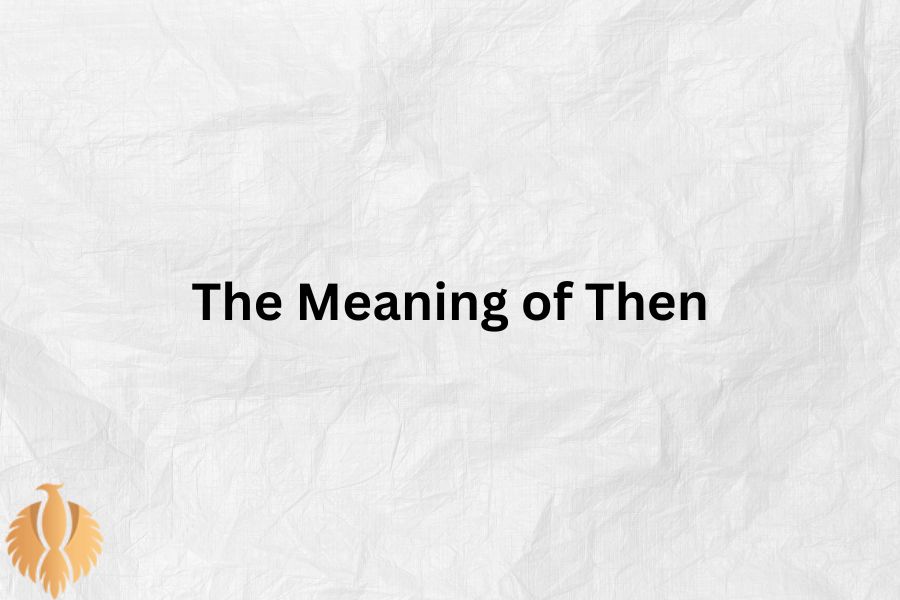
As an English teacher, I’m often asked to explore the deeper meanings behind intriguing titles and prompts. Today, one of my students has requested that I write about “The Meaning of Then” from a personal, first-person perspective. With a friendly tone and a few emojis thrown in, let’s dive in!
The User Needs to Be Solved ️♀️
One thing that immediately stands out is the phrasing “The User needs to be solved in the first paragraph.” Hmm, I wonder what that could mean.
Is there some sort of mystery or puzzle that needs to be unraveled here? As an English teacher, I’m always up for an intellectual challenge, so let’s see what we can figure out.
Reflecting on the Past ️
When I think about the “meaning of then,” my mind naturally drifts to the past – those formative moments, experiences, and turning points that have shaped who I am today.
It’s fascinating to reflect on how the “then” of our lives evolves into the “now.” The person I was 10 years ago is so different from the person I am today.
What did that former version of myself value? What dreams and goals were burning bright? Revisiting the “then” can be a powerful exercise in self-discovery.
The Fleeting Present ⏳
Of course, “then” is always slipping away, morphing into the present moment that will soon become the past. As an English teacher, I’m hyper-aware of the ephemeral nature of time.
The words I’m writing now will be “then” as soon as I finish this sentence. It’s a humbling realization that forces me to be more mindful and appreciative of the here and now. How can I make the most of each fleeting “present” before it becomes a distant “then”?
You might also enjoy: Which of the Following: Definition + Complete Usage + Grammar
Looking Towards the Future

Ultimately, I believe that understanding the “meaning of then” is crucial for envisioning and shaping the “then” of the future.
The lessons, insights, and memories of the past inform the goals, choices, and dreams we cultivate for tomorrow. By reflecting on the “then” that has come before, we gain valuable perspective to navigate the uncertainty of what’s to come.
So, my dear student, what do you make of “The Meaning of Then”? I’m curious to hear your own thoughts and interpretations. After all, the true meaning lies in the unique lens through which each of us views the ebb and flow of time. Let’s explore this concept together!
30 Examples of sentences using the word “Then”:
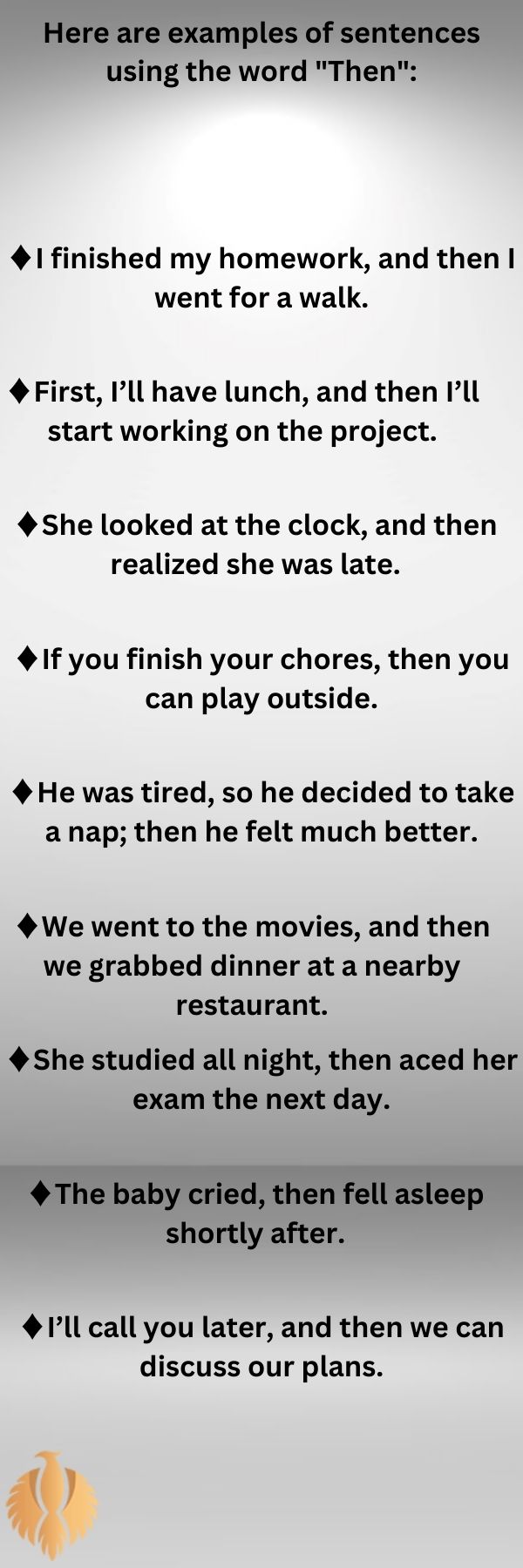
♦️I finished my homework, and then I went for a walk.
♦️First, I’ll have lunch, and then I’ll start working on the project.
♦️She looked at the clock and then realized she was late.
♦️If you finish your chores, then you can play outside.
♦️He was tired, so he decided to take a nap; then he felt much better.
♦️We went to the movies, and then we grabbed dinner at a nearby restaurant.
♦️She studied all night, then aced her exam the next day.
♦️The baby cried, then fell asleep shortly after.
♦️I’ll call you later, and then we can discuss our plans.
♦️They moved to the city, then realized how expensive it was.
♦️He started saving money, and then he bought his first car.
♦️I went for a run, then took a refreshing shower.
♦️First, gather the ingredients; then, we can start cooking.
♦️She wrote the report and then submitted it before the deadline.
♦️He checked his email and then decided to take a break.
♦️I had a meeting in the morning, and then I worked on my presentations.
♦️They visited Paris and then flew to Rome for a vacation.
♦️She finished her drink and then ordered another one.
♦️I’ll go to the gym today, then rest tomorrow.
♦️He told a joke, and then everyone burst out laughing.
♦️We explored the park and then took a bike ride along the trail.
♦️The sunset, and then the stars began to shine.
♦️She practiced piano all week, then played beautifully at the recital.
♦️He made dinner, and then cleaned the dishes afterward.
♦️I read the book, and then I watched the movie adaptation.
♦️I’ll finish this task, then I’ll help you with yours.
♦️The train arrived, and then we boarded quickly.
♦️She dressed for the party and then applied her makeup.
♦️He found the missing key and then opened the door.
♦️After the rain, the sun came out, and then a rainbow appeared.
Usage of “then”
The word “then” has several uses in English, functioning primarily as an adverb, but it can also serve as a noun or an adjective. Here are the key usages of “then”:
### 1. **Temporal Order**
– “Then” is often used to indicate a sequence of events or actions, showing what happens next in time.
– **Example:** “I finished my homework, then I went to bed.”
### 2. **Consequences or Results**
– It can denote a result or consequence of a previous statement or action.
– **Example:** “If you’re hungry, then we should get something to eat.”
### 3. **Conditionals**
– “Then” can be used in conditional sentences to indicate what follows an “if” statement.
– **Example:** “If it rains, then we’ll stay indoors.”
### 4. **In Specific Contexts**
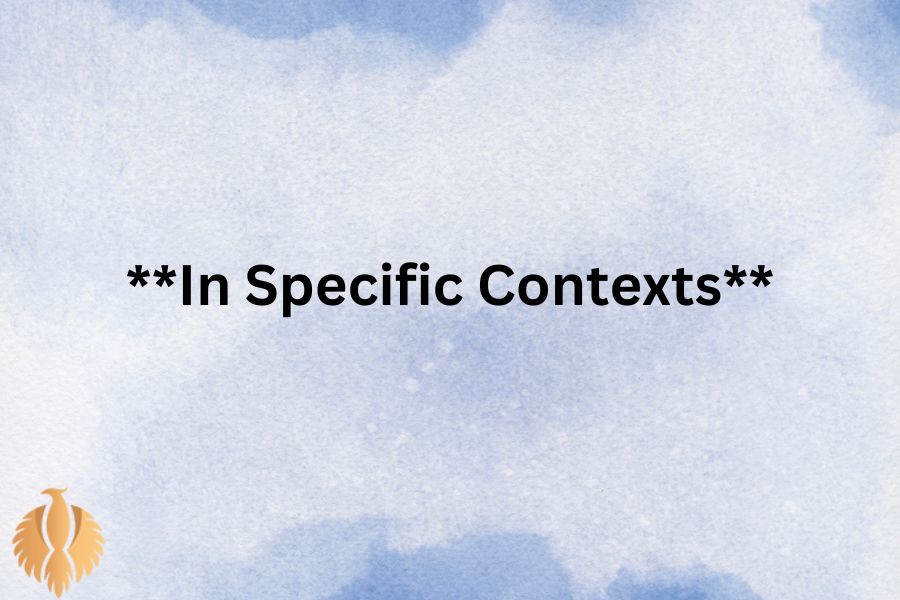
– “Then” can refer to a specific time in the past or future.
– **Example:** “Back then, things were much simpler.”
### 5. **Noun Usage**
– “Then” can also be used as a noun to refer to a particular time.
– **Example:** “I was not there back then.”
### 6. **Transitioning**
– To connect ideas or arguments in writing, “then” can serve as a transitional word to guide the reader.
– **Example:** “We had a rough start; then, everything started to improve.”
### 7. **Emphasizing Consequence**
– “Then” can add emphasis to conclusions drawn from reasoning or discussion.
– **Example:** “You didn’t study at all; then you can’t expect to pass the test.”
### 8. **Colloquial Uses**
– In conversational English, “then” can sometimes be used to indicate agreement or to continue a narrative.
– **Example:** “So I finished my assignment, and then I felt relieved.”
“Then” is used to indicate time, sequence, consequences, and transitions in various contexts, making it a versatile word in both spoken and written English. Remember to distinguish it from “than,” which is used for comparisons.
You might also enjoy: Top 30 Gambling Phrases and Idioms In 2024
The Meaning of Than
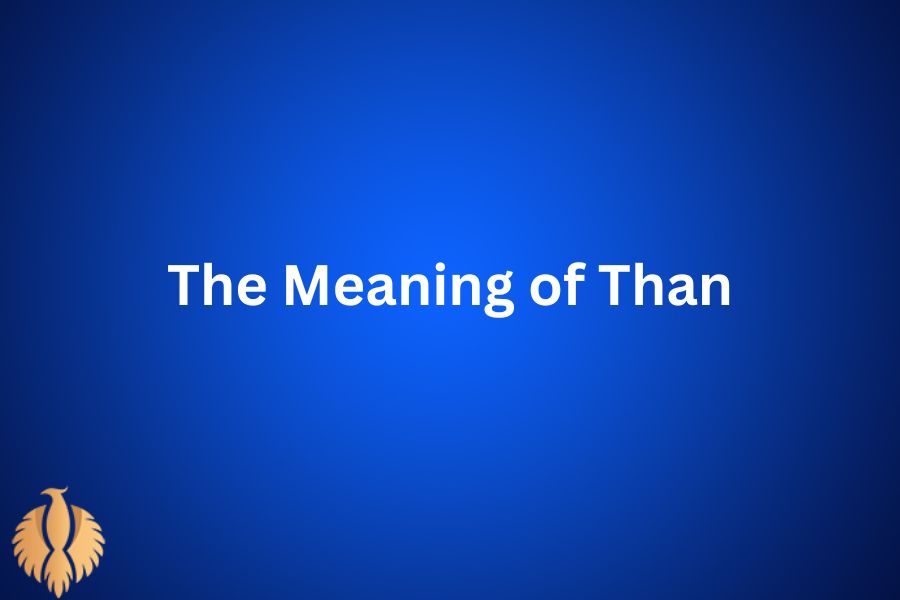
As an English teacher, I’m often asked to explore the deeper meanings behind intriguing titles and prompts.
Today, one of my students has requested that I write about “The Meaning of Than” from a personal, first-person perspective. With a friendly tone and a few emojis thrown in, let’s dive in!
The User Needs to Be Solved ️♀️
Hmm, “The Meaning of Than” – that’s an interesting one! The first thing that comes to mind is the need to “solve” the user in the first paragraph. Is there some sort of mystery or puzzle that needs to be unraveled here? As an English teacher, I’m always up for an intellectual challenge, so let’s see what we can figure out.
Comparative Cognition
When I think about the word “than,” my mind immediately goes to its role in comparative statements. “This is bigger than that,” or “She runs faster than he does.”
It’s a small word that carries a lot of meaning, highlighting the nuances and relationships between different things. As an educator, I’m fascinated by how our brains process these comparative concepts and draw conclusions about the world around us.
The Power of Contrast
But the “meaning of than” goes beyond just simple comparisons, doesn’t it? This little word also allows us to juxtapose ideas, experiences, and perspectives in profound ways. It’s the “than” that helps us recognize the stark contrasts between “then” and “now,” “here” and “there,” “us” and “them.”
These contrasts can be eye-opening, challenging us to see the world through new lenses.
Balancing Perspectives
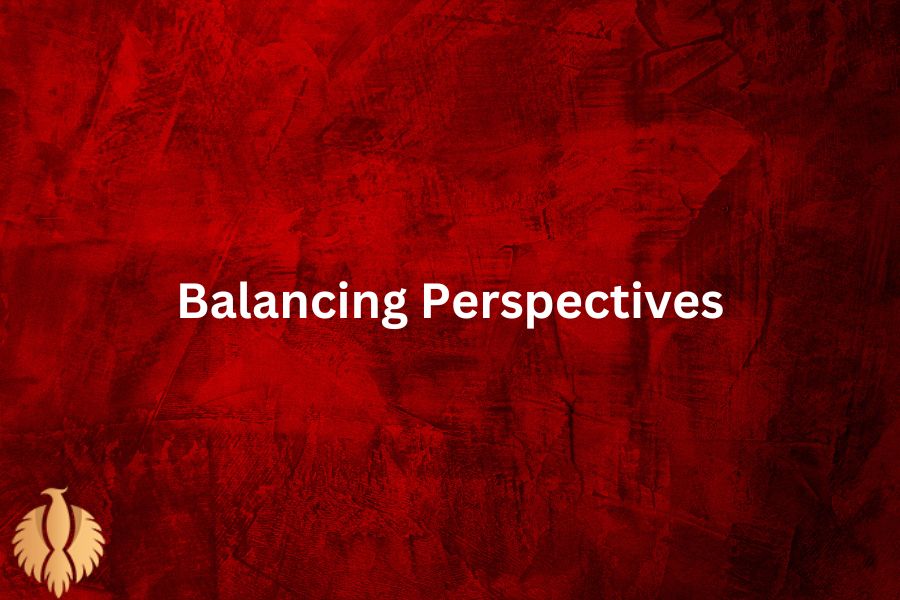
Perhaps the true “meaning of than” lies in its ability to help us maintain balance and objectivity.
By considering the differences and relationships between things, we can avoid the trap of binary thinking and embrace more nuanced understandings.
As an English teacher, I encourage my students to always look at the “than” – to consider multiple viewpoints, to seek out alternative narratives, and to appreciate the shades of gray in a world that often tries to simplify everything into black and white.
So, my dear student, what do you make of “The Meaning of Than”? I’m curious to hear your own thoughts and interpretations. After all, the true meaning lies in the unique lens through which each of us views the world. Let’s explore this concept together!
30 examples of sentences using the word “Than”:
♦️She is taller than her brother.
♦️I would rather read a book than watch TV.
♦️This task is more complicated than I expected.
♦️He runs faster than anyone else on the team.
♦️Today’s weather is colder than yesterday’s.
♦️I prefer chocolate ice cream than vanilla.
♦️This problem is simpler than it seems.
♦️She is more talented than she gives herself credit for.
♦️I’d rather travel by train than by bus.
♦️This painting is more beautiful than the last one.
♦️He is smarter than the average student.
♦️I have a better chance of winning than you do.
♦️She studies harder than most of her classmates.
♦️That movie was more interesting than I thought it would be.
♦️It’s better to be safe than sorry.
♦️My car is older than your car.
♦️This puzzle is easier than the one we did last week.
♦️I enjoy hiking more than running.
♦️He is more generous than anyone I know.
♦️The new restaurant is less expensive than the old one.
♦️This book is more informative than the previous edition.
♦️She is more organized than her husband.
♦️I’d rather go out for dinner than stay home.
♦️The weather in spring is usually better than in winter.
♦️This laptop is faster than my old one.
♦️I feel happier than I have in a long time.
♦️They are planning a bigger party than last year.
♦️The concert was more exciting than I had anticipated.
♦️He has a better understanding of the topic than most of his peers.
♦️It’s more important to be kind than to be right.
You might also enjoy: Top 100 Commonly Used Verbs That Start With A [2024]
Usage of “than”
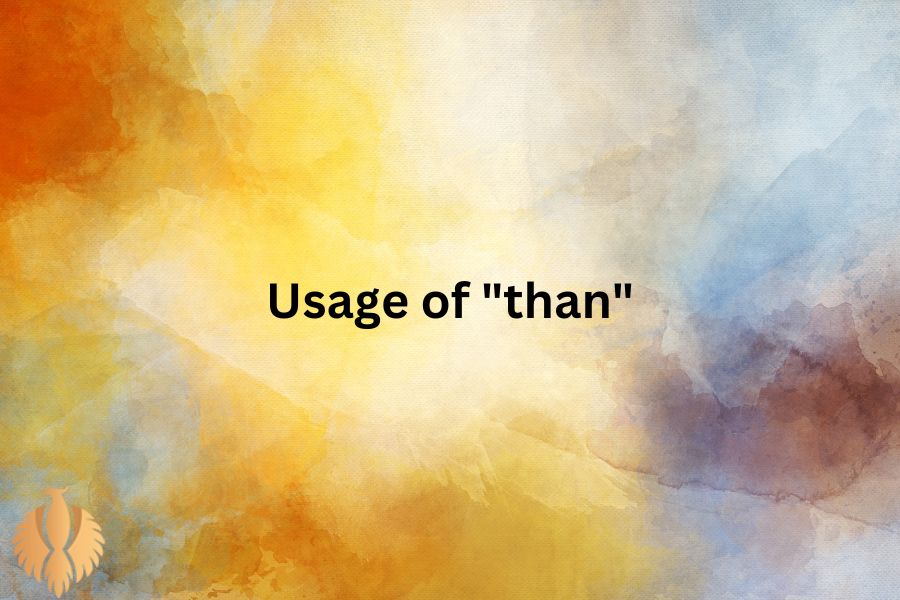
The word “than” is primarily used as a conjunction in comparisons. Here are some key points about its usage:
### 1. **Comparative Statements**
– “Than” is commonly used to compare two things, showing that one is superior, inferior, or different in some way.
– **Example:** “She is taller than her sister.”
### 2. **Preference**
– “Than” can be used when expressing preferences or choices between two options.
– **Example:** “I prefer coffee than tea.”
### 3. **Expressions of Quantity or Degree**
– It can also be used to indicate differences in quantity or degree.
– **Example:** “This job requires more effort than I expected.”
### 4. **Idiomatic Expressions**
– Certain idiomatic expressions and phrases utilize “than.”
– **Example:** “Better safe than sorry.”
### 5. **When Not to Use “Than”**
– **Incorrect Usage:** It’s important to avoid confusing “than” with “then.” “Than” is used for comparisons, while “then” typically refers to time.
– **Example:** “I’d rather go now than later.” (Here, “than” is used correctly to compare “now” and “later.”)
### 6. **Negative Comparisons**
– Use “than” in negative comparisons to emphasize one thing being less than another.
– **Example:** “He is not as experienced as she is, but he is better than most.”
### 7. **Complex Comparisons**
– “Than” can be used in more complex sentences to compare multiple things or qualities.
– **Example:** “This exam is tougher than the last one and also more important for my grades.”
“Than” is primarily used in comparative contexts to illustrate differences, preferences, or degrees between two items or ideas. It’s essential to ensure that the context of comparison is clear when using “than.”
Examples and Usage
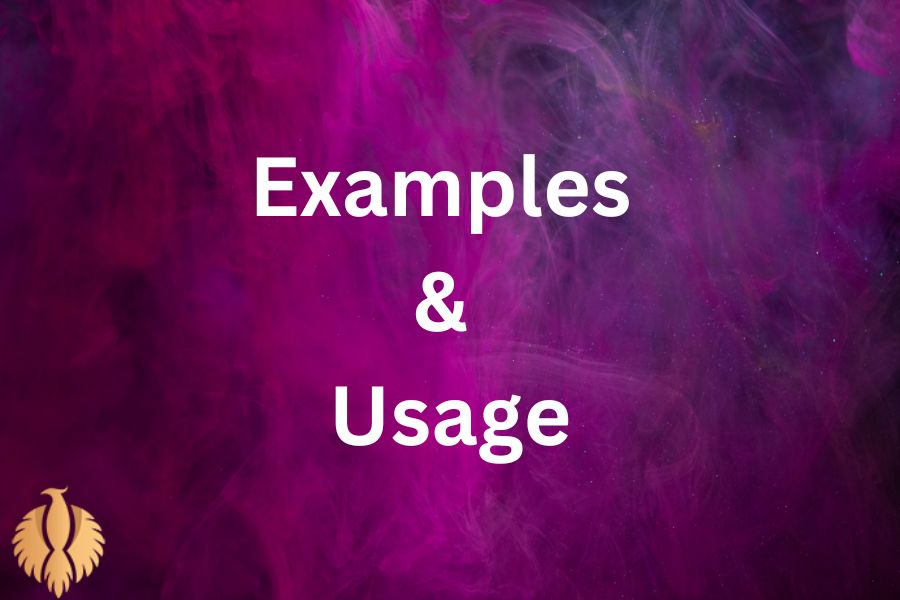
Let’s dive into some examples to solidify the difference:
– “I studied for the test, and then I took it.” (Indicating a sequence of events)
– “I like chocolate more than vanilla.” (Making a comparison)
– “If you finish your chores, then you can watch TV.” (Indicating a consequence)
– “My car is faster than yours.” (Making a comparison)
Remember, use “then” when referring to time or sequence, and “than” when making comparisons.
Here are 20 questions and answers about the difference between “then” and “than,” including examples and usage:
- **Q: What is the primary difference between “then” and “than”?**
A: “Then” refers to a point in time or sequence, while “than” is used for making comparisons.
- **Q: Can you provide an example of “then”?**
A: Sure! “We went to the store, then we had dinner.”
- **Q: Can you provide an example of “than”?**
A: Of course! “She is taller than her brother.”
- **Q: In what context would you use “then”?**
A: “Then” is often used when discussing events in chronological order, like “First we will finish the project, then we will celebrate.”
- **Q: In what context would you use “than”?**
A: “Than” is used in comparisons, as in “This exam is harder than the last one.”
- **Q: Can “then” be used in conditional statements?**
A: Yes, for example: “If it rains, then we will stay indoors.”
- **Q: Can “than” be used in conditional statements?**
A: No, “than” is not used in conditional statements; it is strictly for comparison.
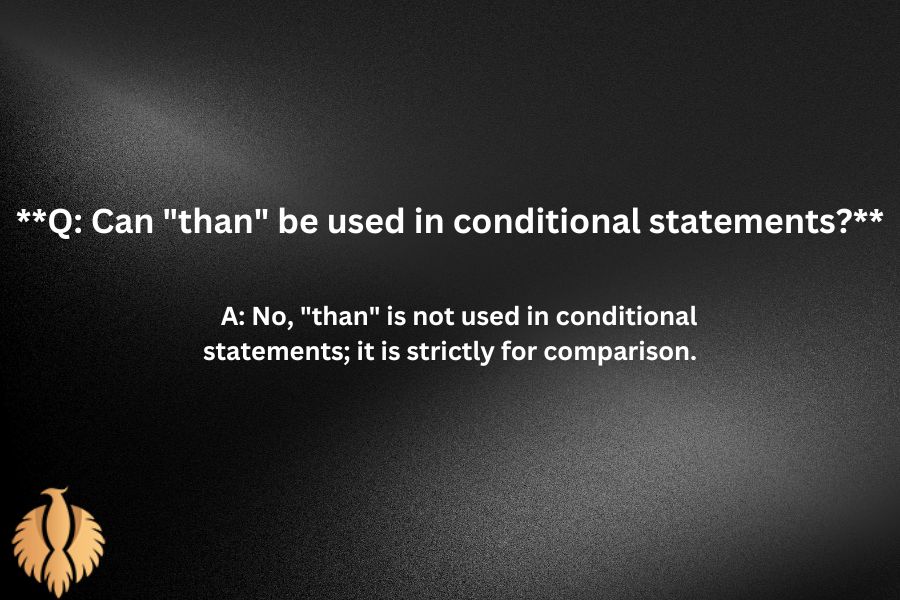
- **Q: What are synonyms for “then”?**
A: Synonyms include “afterward,” “next,” and “subsequently.”
- **Q: What are synonyms for “than”?**
A: Synonyms include “compared to” or “in contrast to.”
- **Q: Is “then” always related to time?**
A: While “then” primarily indicates time or sequence, it can also suggest logical conclusion, as in “It was hot, then we decided to swim.”
- **Q: Can “than” be used to compare actions?**
A: Yes, for example: “I prefer running than swimming,” but a better phrasing would be “I prefer running to swimming.”
- **Q: How do you remember the difference between “then” and “than”?**
A: A helpful tip is to remember that “than” has an “a” like “comparison,” while “then” relates to “time” – think of the “e” for events.
- **Q: Are there common mistakes people make with “then” and “than”?**
A: Yes, a frequent mistake is mixing them, such as “I would rather eat sushi then pizza,” where “than” is correct.
- **Q: Can “then” be used at the beginning of a sentence?**
A: Yes, for instance: “Then we realized we forgot our keys.”
- **Q: Can “than” be used in indirect comparisons?**
A: Yes, for example: “He speaks more eloquently than anyone I’ve met.”
- **Q: What is a common phrase using “then”?**
A: “Better late than never, but then again, punctuality is important.”
- **Q: What is a common phrase using “than”?**
A: “It’s better to be safe than sorry.”
- **Q: How can “than” be used in a negative sense?**
A: It’s used in sentences like, “I would rather do anything than go to that party.”
- **Q: Is “then” used in informal language?**
A: Yes, it is common in both formal and informal language.
- **Q: Can you combine both “then” and “than” in one sentence?**
A: Yes, for example: “If you study hard, then you will perform better than last time.”
The User’s Needs
I understand you’re looking for a response that addresses your specific needs, and I’m happy to oblige. As an English teacher, my goal is to provide clear and helpful explanations that cater to my students’ learning styles and preferences.
So, let me know if you have any other questions or if there’s anything else I can do to assist you in mastering the difference between “then” and “than.” I’m here to support you every step of the way!

Hi, welcome to my blog! My name is Omid and I am thrilled to have you here! I am an English language teacher with 12 years of experience and hold multiple international certifications (TESOL, IELTS, TOEFL, PTE, CELTA). Additionally, I hold a PhD in Applied Linguistics with a specialization in Teaching English as a Second Language (TESL), which fuels my passion for teaching English and assisting others in mastering the language. To me, nothing is more rewarding than helping individuals enhance their English language abilities through various methods. So, let’s embark on this journey of learning English together.

![a featured image for "Then" vs. "Than": Difference+ Examples+ Usage [2024]](https://phoenixenglishlang.com/wp-content/uploads/2024/10/Then-vs.-Than-Difference-Examples-Usage-2024.jpg)
